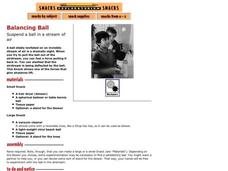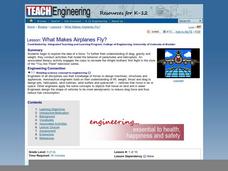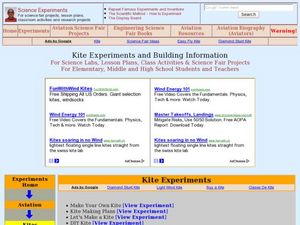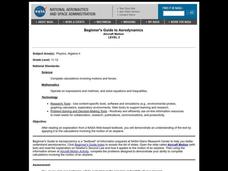Teach Engineering
Building-Testing-Improving Paper Airplanes: Head's Up!
Take foldables to all new heights. Pupils build and fly different types of paper airplanes in the 14th portion of a 22-part unit on aviation. Groups collect data on distance and flight time for each plane and compare the data from the...
Teach Engineering
Take Off with Paper Airplanes
Let's go fly a kite ... oops, a paper airplane! The 13th segment in an aviation unit of 22 relates the parts of an airplane to paper airplanes. Pupils learn the functions of the control surfaces of a plane to really make their knowledge...
Curated OER
Wright Again: 100 Years of Flight
Aspiring aeronautical engineers demonstrate different forces as they construct and test paper airplanes. This lesson plan links you to a website that models the most effective paper airplane design, an animation describing the forces...
Exploratorium
Balancing Ball
Demonstrate lift to the class that is studying aerodynamics. In the stream of air produced by a blow dryer, little physicists place a wad of tissue paper and a spherical figure to compare. Or, if you have a vacuum cleaner and beach ball,...
Curated OER
Exploring Aerodynamics
Students explore aerodynamics. For this aerodynamics lesson, students study the flight patterns of three paper airplanes and discover the underlying principles of aerodynamics. Resources and grade level modifications are present.
Teach Engineering
Better By Design
Which modification is the best? Using the scientific method, pairs determine the effects of each control surface on the distance of a glider's flight. The activity, section 16 in a 22-part unit on aviation, allows pupils to gain a better...
Curated OER
Bubble-ology and Bernoulli
Students explore aerodynamics and Bernoulli's principle by devising ways to keep bubbles aloft.
Curated OER
Forces, Controls And Aircraft Systems
Students are introduced to the physics of flight through video and PowerPoint presentations. They construct and fly model gliders and compete for height, distance, time, etc.
Curated OER
Aviation, Aeronautics and Aerodynamics
Students investigate the physics of flight through various experiments. In this physics instructional activity, students construct different flying objects. They explain the dynamics that make these object fly.
Cornell University
Physics of Flight
Up, up, and away! Take your classes on a physics adventure. Learners explore the concepts important for flight. They experiment with the Bernoulli Principle while learning the forces that act on airplanes in flight.
Curated OER
Paper Airplanes
Students study paper airplanes. In this lesson on aerodynamics, students print out the folding directions for making paper airplanes and after making the planes test their paper airplanes to see how well each flies. Students weigh...
Curated OER
Science: Flight Aerodynamics
Students apply the principles of aerodynamics by constructing styrofoam airplanes. By using simple tools and materials, they improve their spatial visualization abilities while increasing motor skills. After small groups of students...
Curated OER
Aerodynamics
Students discover the basic principles of aerodynamics, including the roles and identity of natural forces involved. They examine how the force of gravity is overcome by the curved shape of an airplane wing and air pressure.
Curated OER
What Makes Airplanes Fly?
Students examine force and conduct activities that model parachutes and helicopters. In this airplanes lesson plan students identify the forces that make airplanes fly higher and land.
Curated OER
Kite Experiments and Building Information
Students build their own kite following certain procedures. In this physics lesson, students explain the aerodynamics concepts involved in flying kites. They trace the development of aviation.
Curated OER
Cruising Aircraft and Balanced Forces
Students, after reading an explanation from a NASA Web-based textbook, demonstrate an understanding of the text by applying it to questions involving cruising aircraft and balanced forces.
Curated OER
ESL Holiday Lessons: Aviation Day
In this language skills worksheet, students read an article regarding Aviation Day. Students respond to 6 matching questions, 29 fill in the blank questions, 30 multiple choice questions, 12 word scramble ...
Teach Engineering
What a Drag!
Stop and drop what is in your hand! Pupils investigate how form effects drag in the 12th part of a 22-part unit on aviation. Groups create equally weighted objects and determine which one falls the fastest by collecting data.
Yale University
Airplane Mathematics
The history of aerodynamics is rich with experimentation and international collaboration. Author Joyce Bryant relays this dynamic past and provides math word problems using the formula of lift, the force that makes airplanes fly. She...
Curated OER
Aircraft Motion
Students, after reading an explanation from a NASA Web-based textbook, demonstrate an understanding of the text by applying it to the calculations involving the motion of an airplane.
Curated OER
Aircraft Motion
Students, after reading an explanation from a NASA Web-based textbook, demonstrate an understanding of the text by applying it to the calculations involving the motion of an airplane.
Curated OER
Aerodynamics of a Boomerang
Students examine how aerodynamic forces affect the flight of aircraft, animals and sports balls and projectiles (like a javelin or boomerang). They discover the origins of the boomerang and early usage in hunting.
Teach Engineering
Airplane Tails and Wings: Are You in Control?
Keep everything under control. The lesson, the 16th segment in a 22-part unit, provides a more detailed look at the parts of a plane, specifically the control surfaces. Pupils learn about the construction of the wings and the tails and...
Curated OER
The Physics of Flight
Three activities allow young flight engineers to understand the 4 principles of flight (weight, lift, thrust, and drag), to construct a glider, and to create a propeller. Multicultural history and literature are integrated by reading...

























